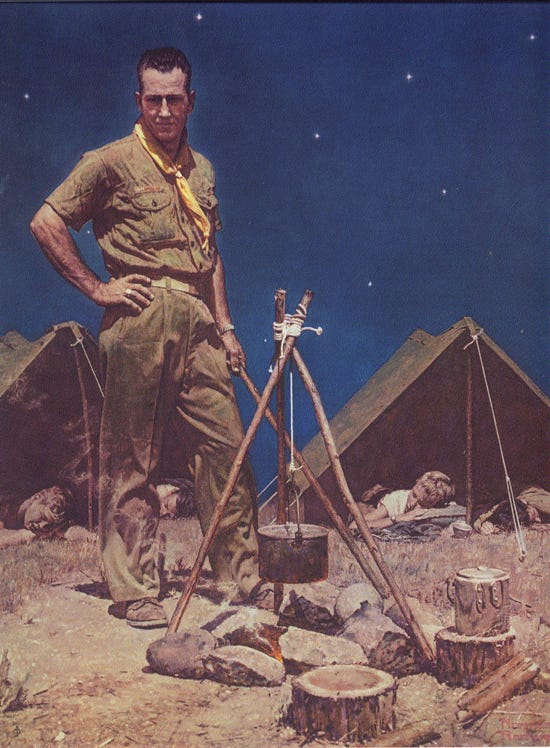The American painter Norman Rockwell ranks among my favorite artists. Though often dismissed by the art establishment as sentimental or illustrative rather than “serious,” Rockwell’s work deliberately repudiates the disintegration that dominated 20th-century art. As modernist and postmodern schools reduced art to chaos, distortion, and alienation—treating man as a fragmented, helpless being adrift in a senseless universe, Rockwell did the opposite: he portrayed man as whole, intelligible, and capable of purposeful action in a world that could be understood and valued. Rockwell upheld a view of life as coherent and worth living—not absurd, not tragic, but rationally graspable and morally significant.
Rockwell’s art is not only technically masterful but philosophically defiant. He rejected the nihilism masquerading as depth and instead depicted a world where values matter and character shapes destiny. That choice—to stand against the artistic orthodoxy of his age and portray man as a sovereign moral agent—makes Rockwell not a relic of American nostalgia, but a heroic figure in the history of art.
This first installment in my revised series on Rockwell’s greatest achievements examines The Scoutmaster—a restrained yet powerful statement on earned authority, stewardship, and the preparation of future men.
The Scoutmaster
This painting depicts a man standing sentinel over the glowing embers of a nighttime fire while boys slumber peacefully in their tents. The starry blue of the night sky and the dry, rocky soil suggest a remote and secluded location. The man, fit but unassuming, wears a uniform—but he is neither a soldier, a policeman, nor a hunter. He carries no weapon or badge of office. No threat is present, yet he stands quiet watch regardless. His ringed hand rests lightly on his hip, while his other hand gently rakes the coals, with a wisp of smoke curling into the still night air. His face is turned just beyond the frame. We don’t know what he sees. But his expression is calm, almost introspective—his gaze directed inward more than outward.
The boys’ varied hair colors show they are not his own, yet he watches over them as if they were. A small tripod stands over the fire, lashed with a cord whose bitter ends hang loose—knots clearly tied by a novice’s hand. An aluminum pot hangs from the tripod; a coffee pot rests nearby. Rocks and small stumps ring the low fire. Hunger or hardship plays no part in this scene. Instead, Rockwell presents an image of calm assurance—a man standing silently as the trusted guide of future men.
Rockwell’s technical execution in The Scoutmaster reflects a disciplined and intimate understanding of the human figure. The man’s relaxed stance reads as wholly natural, not posed or theatrical. The folds in his uniform fall with convincing weight, and the slight lift of his neckerchief in the night air suggests movement without disrupting the stillness of the scene. These are not accidents of talent but the result of deliberate observation. Rockwell knew how the body moves—and how fabric moves with it. This precision isn’t decorative; it’s essential to making the scene believable, and therefore, meaningful.
But what gives the painting its lasting power is its moral substance. It depicts an unassuming but deeply consequential act: a man who leaves comfort behind to guide boys through the wilderness, teaching them to cooperate, shoulder responsibility, and grow into men of purpose and honor. There is no ceremony or dramatics—just a man living his values and passing them on through action. His authority comes not from rank or force, but from the steady example he sets. Rockwell doesn’t sentimentalize this role; he shows it as it is—demanding, noble, and real. The painting affirms that manhood is not something conferred by age or biology, but something cultivated and earned.
Set this scene in the Middle Ages, and one easily imagines the man as a knight and the boys as his squires—youths who serve their lord. However, here, Rockwell reverses the dynamic: the man serves the boys. This is not an expedition for foraging or war. It is a deliberate mission of instruction, aimed at teaching boys the arts of self-reliance and personal independence. That is why I see this painting as embodying a distinctively American moral premise. In a land of freedom and abundance, the true test is not survival, but self-governance. Rockwell shows us a man preparing the next generation for that task.
In The Scoutmaster, Rockwell captures the steady nobility of those who dedicate themselves to shaping the independent men of tomorrow. The Scoutmaster is not a world-shaker or a revolutionary. But he is something many men can immediately recognize and aspire to: a man who teaches boys how to become men, not by command, but by example. He embodies earned authority, calm strength, and moral presence. In portraying him, Rockwell affirms that greatness often lies in the private acts of guidance and guardianship that make civilization possible.
In a time when manhood is mocked, distorted, or denied, Rockwell reminds us that it must still be taught—quietly, deliberately, and by men who live what they ask others to become. So long as this image endures, so too will the values it upholds.
Future installments:
Part II: The Homecoming Marine
Part III: Lincoln the Railsplitter
Part IV: The Problem We All Live With
Part V: Freedom of Speech





